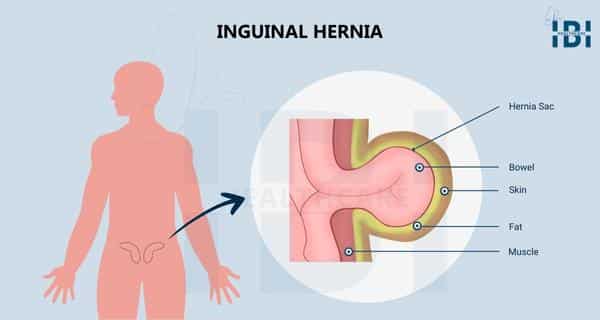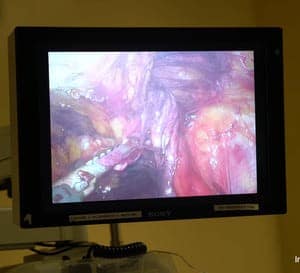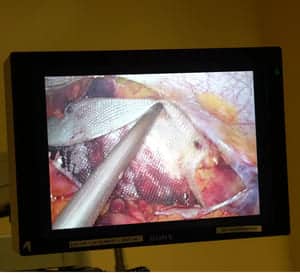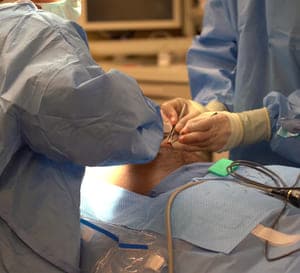What is an Inguinal Groin Hernia?
Discover laparoscopic inguinal Groin hernia repair surgery. In particular, what to expect during and after the procedure. A hernia can form when an individual has a weak spot in their abdominal muscles. Moreover, it exerts pressure on internal tissues and organs.
Eventually, the pressure caused by straining or lifting a heavy object. Additionally, it can push a small section of the intestinal tissue out through that weak spot creating a hernia. Though, an inguinal hernia is normally located on either side of the pelvic bone.

What are the Henia Causes, Triggers and Symptoms?
Besides this, inguinal groin hernias are not usually dangerous. But often cause pain or discomfort. In addition to this, some signs of an inguinal groin hernia include:
- Pain or burning at the bulge area.
- Pain in the groin when coughing, lifting, or bending over.
- Men may experience pain or swelling around the testicle.
- A feeling of heaviness, pressure, or weakness in the groin area.
- The presence of a bulge on either side of the pubic bone. The bulge is usually more noticeable when standing, coughing, or straining.
However, in rare cases, the hernia may become trapped (strangulated) causing a medical emergency. Hence require immediate medical attention. Meanwhile, some of the signs and symptoms of a strangulated hernia include:
- Fever.
- Vomiting, nausea or both.
- Sharp sudden pain that gets worse.
- Constipation and bloating from unpassed gas.
- The hernia bulge turns purple, red, or dark in color.
Who is a Candidate for Hernia Repair?
Some surgeons prefer to repair hernias rather than take the “watchful waiting” approach. To avoid any potential complications. But in general, individuals may be a candidate for surgical inguinal groin hernias if:
- The hernia is large.
- The hernia is causing pain.
- The hernia continues to grow.
- The hernia appears to be in danger of becoming strangulated.
Inguinal Groin Hernia - Procedure Overview
Despite hernias do not go away on their own. Even so, approximately 75% of individuals with a hernia will require surgical treatment to repair the hernia and alleviate symptoms. Surely, wearing a protective corset, Truss, or Binder can help contain the hernia bulge. But will not fix the hernia. Evidently, there are no options for inguinal hernia treatment without surgery.
Regardless, surgeons can use two surgical techniques to perform inguinal hernia repair. Laparoscopic inguinal groin hernia repair and open inguinal hernia repair. Likewise, surgeons can perform laparoscopic surgery freehand or robotically. Whereas the surgeon controls robotic arms through a computer.
How Do Surgeons Perform Hernia Repair?
Firstly, surgeons perform laparoscopic or robotic inguinal hernia repair under general anesthesia. Nonetheless, considered as an outpatient procedure. Unquestionably, laparoscopic hernia repair is minimally invasive and performed through several small incisions in the abdomen. Similarly, a laparoscope, small hollow tube-shaped surgical instrument. Because a camera, outfitted on the equipment, guides the surgeon while repairing the inguinal groin
Basically, surgeons use the camera as a guide to insert other tiny instruments through the incisions. Finally, complete the inguinal hernia repair. However, surgeons repair most groin hernias using surgical mesh, although not all. In reality, repairing an inguinal hernia with mesh. Additionally, strengthens the weak portion of the abdominal wall preventing the hernia from protruding.
Advantages of Laparoscopic Inguinal Hernia Repair vs. Open Surgery
- Faster recovery time.
- Lower risk of infection.
- Surgeons can use it on patients who have scar tissue from previous hernia repair.




Open Inguinal Hernia Repair
During open inguinal hernia repair, the surgeon makes an incision in the groin area to access the protruding hernia. As a result, the surgeon pushes the groin hernia back in through the abdominal wall. Then, the surgeon often reinforces the area with surgical mesh and sutures it together.
Furthermore, surgeons can perform open hernia repair under general anesthesia. But surgeons can also use local anesthesia, so this may be a good option for patients. Especially, individuals who are at elevated risk of complications from general anesthesia.
Laparoscopic Inguinal Groin Hernia Repair - Recovery Time
Without a doubt, the recovery from hernia repair varies. For instance, depending on the degree of the hernia, and the surgical technique used. Equally important, the patient’s overall health. Although, the typical recovery from laparoscopic inguinal hernia surgery is one to two weeks. While recovering from open hernia surgery can take three to four weeks.
Laparoscopic Inguinal Groin Hernia Repair - Procedure Cost
Indeed, the cost of groin hernia surgery will vary due to multiple factors. Such as the use of mesh, the size of the hernia, the technique of hernia repair used, and patient health. In particular, the average cost of inguinal groin hernia repair in the United States ranges between $4,200 and $6,200.
As a matter of fact, inguinal groin hernia surgery is not a cosmetic procedure. Therefore, covered by health insurance. Nevertheless, patient responsibility will be dependent on the type and use of insurance, FSA, or HSA programs. Further, interested in learning more about inguinal hernia repair. In any event, call us or schedule a consultation with a specialist.





